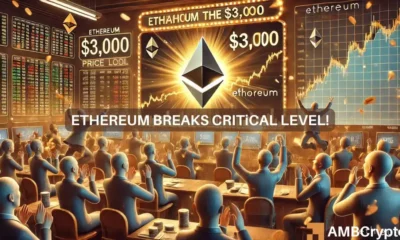Altcoin
Why Shiba Inu bulls could fall to bears
Like the rest of the market, SHIB’s price increased following 13 July’s court ruling. However, the token’s uptick is not without its risks.
- SHIB’s bid-ask volume imbalance tilted towards the bullish end.
- The token was overbought and selling pressure could draw it further down.
As the crypto market dynamic changed for the better, Shiba Inu [SHIB], which has been facing a challenging landscape, followed suit. One reason for this notion was IntoTheBlock’s data showing how SHIB’s bid-ask volume switched to the bullish side at 6.50%.
Is your portfolio green? Check out the Shiba Inu Profit Calculator
The bid-ask volume shows the relation of buying and selling volumes by considering the number of desired purchases at a particular price. Usually, high bid volumes suggest strong demand, with investors willing to buy the involved asset.
In this case, the price rises. However, when the ask volume is higher, it suggests that more traders are willing to sell. Here, the price tends to go lower.
More demand but sellers are lurking
So, in SHIB’s case, demand was higher, which was proven as the token’s price increased by 5.34% in 24 hours. While SHIB gained significant traction, recent market dynamics also suggest that the road ahead may not be smooth for the token.
One reason this has come into play is the way a number of large transactions have ended in bearish outcomes. But has demand been able to surpass selling pressure?
Well, according to the SHIB/USD daily chart, demand initiated at $0.0000071 could not override sellers’ nullification at $0.0000077.
And even though SHIB’s volatility had contracted as shown by the Bollinger Bands (BB), the token could face another decline. This was because the token price touched the upper band.
Because of this, SHIB could be considered overbought. This could also be one of the reasons that the price fell from $0.0000078.
As per the Moving Average Convergence Divergence (MACD), the daily chart showed that momentum was still in the contest between bulls and bears. This was because the orange and blue dynamic lines closed in on each other.
However, buyers had little exchange over sellers. So, SHIB’s potential to fall sharply almost didn’t exist.
Flow remains in bears’ control
Looking at on-chain data further, Santiment showed that SHIB’s exchange inflow had risen to 122.26 billion. This metric represents the number of tokens sent into exchanges. In most cases, when this metric spikes, it means that there’s a lot of intent to sell.
Conversely, the exchange inflow was 59.55 billion. Unlike the inflow, the exchange outflow measures the tokens sent out of exchanges to cold storage or self-custodial wallets.
Realistic or not, here’s SHIB’s market cap in DOGE terms
An increase in this metric means holders have the motive to keep the asset in question for the long term.
With the difference in exchange outflow and inflow, it is possible that SHIB will experience more selling pressure soon.
